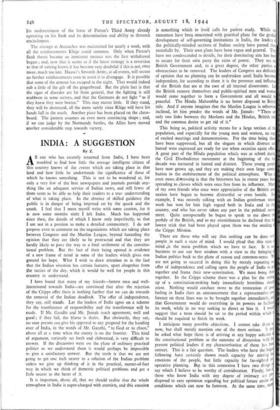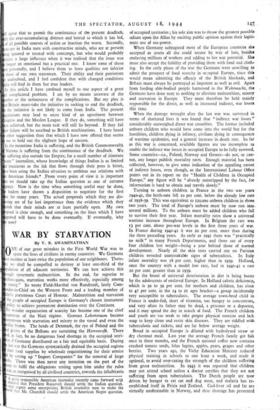INDIA : A SUGGESTION
By Z.
AS one who has recently returned from India, I have been troubled to find how little the average intelligent citizen of this country knows of the events which are taking place in that land and how little he understands the significance of those of which he knows something. This is not to be wondered at, for only a very few of the best newspapers and journals provide any
like an adequate service of Indian news, and still, fewer of them seem to be able to help their readers to a true understanding of what is taking place. In the absence of skilled guidance the public is in danger of being imposed on by the quack and the crank. I feel that I must myself write with some caution, for it is now some months since I left India. Much has happened since then, the details of which I know only imperfectly, so that I am not in a position to make a detailed commentary. I do not propose even to comment on the negotiations which are taking place between Congress and the Muslim League, beyond hazarding the opinion that they are likely to be protracted and that they are hardly likely to pave the way to a final settlement of the constitu- tional problem. But the fact of their being opened is evidence of a new frame of mind in some of the leaders which gives one ground for hope. What I wish to draw attention to is the fact that the Indian situation has certain features, apart altogether from the tactics of the day, which it would be well for people in this country to understand.
I have found that many of my friends—honest men and well- intentioned towards India—are convinced that after the rejection of the Cripps offer there is nothing further that we can do towards the removal of the Indian deadlock. The offer of independence, they say, still stands. Let the leaders of India agree on a scheme for the transference of responsibility and the transference will be made. If Mr. Gandhi and Mr. Jinnah reach agreement, well and good ; if they fail, the blame is theirs. But obviously, they say, no sane person can give his approval to any proposal for the handing over of India, in the words of Mr. Gandhi, " to God or to chaos," above all at a time when the enemy is on the frontier. This kind of argument, variously set forth and elaborated, is very difficult to answer. If the discussion were on the plane of ordinary practical politics as we understand them it would perhaps be impossible to give a satisfactory answer. But the truth is that we are not going to get one inch nearer to a solution of the Indian problem unless we give up thinking of it in the practical, matter-of-fact way in which we think of domestic political problems and get a little nearer to the heart of it.
It is important, above all, that we should realise that the whole atmosphere in India is super-charged with emotion, and this emotion
is something which in 'itself calls for patient study. While our statesmen have been concerned with practical plans for the gradual development of self-governing institutions in India, the leaders 01 the politically-minded sections of Indian society have passed these scornfully by. Their own plans have been vague and general. They have not condescended to details, for their dominating aim has ben to secure for their own party the reins of power. They see the British Government and, to a great degree, the other parties a obstructions to be removed. The leaders of Congress are definitely of opinion that no planning can be undertaken until India becoma independent, for according to them it is the presence and influence of the British that are at the root of all internal dissensions. Le the British remove themselves and public-spirited men and women would come together to form a Government and all would be peaceful. The Hindu Mahasabha is no better disposed to British rule. And if anyone imagines that the Muslim League is otherwise inclined, let him ponder the words of Mr. Jinnah: "There are only two links between the Moslems and the Hindus, British rule and the common desire to get rid of it."
This being so, political activity means for a large section of the population, and 'especially for the young men and women, an orgy of excited meetings and demonstrations. For the time being these have been suppressed, but all the slogans in which distrust and hatred were expressed are ready for use when occasion again offers. A great part of the Hindu population which was at school during the CiVil Disobedience movement at the beginning of the last decade was nurtured in hatred and distrust. These young people have now grown up, and they are making their own large coma- bution to the embitterment of the political atmosphere. What is even more. distressing is that the bitterness has in recent years be spreading to classes which were once free from its influence. Many of my own friends who once were appreciative of the British con- nexion have begun to become distrustful or even hostile. Fa example, I was recently talking with an Indian gentleman whose work has won for him high regard both in India and in this country, and who has never taken any part in the political moo ment. Quite unexpectedly he began to speak to me about t perfidy of the British, and to my astonishment he declared that th lowest trick that had been played upon them was the sending d the Cripps Mission.
There are those who will say that nothing can be done with people in such a state of mind. I would plead that this state d mind 1is the main problem which we have to face. It is out business to use our best wisdom with ,a view to the bringing of Indian politics back to the plane of reason and common-sense. \V are not going to succeed in doing this by merely repeating our offer of independence and calling upon the people of India to gel together and frame their new-constitution. We must bring rho together. In the Cripps scheme there was a plan for the setting up of a constitution-making body immediately hostilities should cease. Nothing would conduce more to the restoration of g feeling in India than an announcement that a representative coo- ference on these lines was to be brought together immediately, and that Government would do everything in its powers to facilitate its work, while in no way seeking to direct or bias it. I meld suggest that a term should be set 'to the period within which if should be required to finish its work.
I anticipate many possible objections. I cannot take these of now, but shall merely mention one of the most serious. It ma be asked what hope there is of arriving at any happy solution the constitutional problem as the outcome of discussion with present political leaders if my characterisation of 'them has correct. This is a fair question. The leaders who have the latit4 following have certainly shown much capacity for stirring emotions of the people, but little capacity for far-sighted re' operative planning. But in this connexion I have two things say which I believe to be worthy of consideration. Firstly, few those who know India with any degree of intimacy are P disposed to easy optimism regarding her political future under
conditions which can now be foreseen. At the same time, in - .
ill agree that to permit the continuance of the present deadlock, di the ever-accumulating distrust and hatred to which it has led, of all possible courses of action or inaction the worst. Secondly, ere are in India men with constructive minds, who are at present ing ignored or treated with contempt, but who would probably ercise a large influence when it was realised that the issue was longer an emotional but a practical one. I know some of these en personally, and I believe them to have qualities not inferior those of our own statesmen. Their ability and their patriotism e undoubted, and I feel confident that with changed conditions dia will find in them her true- leaders.
In this article I have confined myself to one aspect of a great
d complicated problem. I am by no means unaware of the mber or the seriousness of the complications. But my plea is arBritain must•take the initiative in seeking to end the deadlock, r the -initiative is not likely to come from India. The present gotiations may lead to some kind of an agreement between ngress and the Muslim League. If they do, something will have en achieved, but the main task will still lie beyond. If they fail it failure will be ascribed to British machinations. I hasie heard other suggestion than that which I have now offered that seems me to hold out the slightest hope of success.
In the meantime India is suffering, and the British Commonwealth Nations is suffering from the continuance of the deadlock. We suffering also outside the Empire, for a small number of itinerant Lunt" journalists, whose knowledge of things Indian is as limited
d inaccurate as the ink that flows through their pens is bitter, ye been using the Indian situation to embitter our relations with American friends.* From 'every point of view it is important t we should take up the Indian question as one of extreme ency. Now is the time when something useful may be done, leaders have shown a disposition to negotiate for the first e for many years. The actual proposals which they are dis- ssing are of far lesi importance than the evidence which they ish that their minds are at least partially open. My own posal is clear enough, and something on the lines which I have gested will have to be done eventually. If eventually, why t now?























 Previous page
Previous page